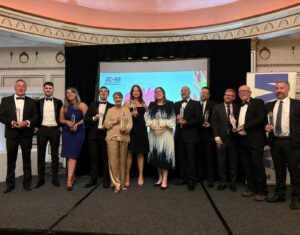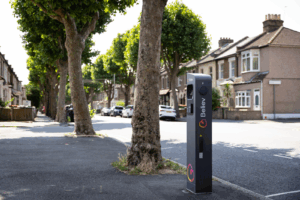“Facetune Portraits: Universal Beauty” – AI-driven art exhibition opens @ Hope 93 Gallery

US born, London-based artist, Gretchen Andrew, is set to unveil a powerful oil-painting series incorporating AI, algorithms, and robotics, exposing the homogenising impact of social-media driven image manipulation and the messy co-existence we have with our digital selves. Featuring 100 Miss Universe contestants, from 100 countries, Facetune Portraits: Universal Beauty explores technology’s impact on society, and how monocultural beauty ideals are collapsing human diversity. The first show of the provocative 100-piece portrait collection will be unveiled at Fitzrovia, London-based art gallery, Hope 93, at a private view, followed by a five-week public exhibition at the venue.
In a world obsessed with perfection, what happens when beauty is no longer personal, but programmed? Once beauty was as diverse as humanity itself, shaped by culture, history and individual expression. But today we face the disturbing reality that our concepts of beauty are being quietly standardised by algorithms. With every swipe and filter, we increasingly conform to a single template of beauty. One designed, not by diverse human cultures but by code that knows nothing of our own uniqueness. Gretchen Andrew’s revolutionary Facetune Portraits: Universal Beauty series confronts this digital homogenisation head on.
Using an oil paint printer and custom-built robotics, driven by the same algorithms found in popular AI-driven beauty filters on social media, Gretchen physically manifests the digital distortions society has normalised. The portrait series features 100 Miss Universe contestants – paragons of conventional and universally celebrated beauty – visually exploring how these alterations shape our perception of attractiveness. Typically, with image altering or touch up apps, these modifications occur seamlessly, sculpting faces and bodies into a single, homogeneous look and we see diversity disappear. By making this process visible, Gretchen presents a dual portrait; the AI-perfected face superimposed on its unaltered counterpart. The result is a striking visualisation of reality confronting desire, a full-body portrait charged with tension, where every brush stroke, smudge, and painterly contradiction is a record of conflict between our natural appearance and the ideal imposed by AI.
Turning traditional portraiture’s aim of capturing a true likeness on its head, the works expose the absurdity of the digital era’s ‘perfections’ – hidden scars that lie beneath the polished images we consume. They reveal a deeper yearning, not only to be beautiful, but to conform and be like everyone else, accepted as much by the algorithms as by our peers.
Gretchen Andrew said: “Facetune Portraits: Universal Beauty is about reclaiming the true meaning of beauty and celebrating our differences rather than erasing them. When you see these portraits, you witness the literal contortion of identity that happens beneath the screens. It isn’t just art, it’s a resistance against a future where algorithms dictate our self-image. I’m excited to be partnering with Hope 93, who share my vision of celebrating diversity, to finally unveil my body of work for Londoners.”
Drawing on her former career in Silicon Valley, before going on to train as an apprentice alongside British figurative painter, Billy Childish, Gretchen Andrew is known for her unique fusion of traditional photography and oil-paint mediums with advanced technologies, such as robotics, AI and algorithms. Gaining prominence in 2019 when her subversive hacks on the art world and political institutions led to global visibility, Grethen coined the term ‘search engine art’ and established herself as the world’s first search engine and internet imperialist artist. Her exploration of portraiture in the new digital world is driven by a desire to expose the chasm between how women really look and the physical perfection they strive for because cultural beauty ideals manifested in image-altering apps such as Facetune have shaped their view of how they should look.
Founded by Aki Abiola in September 2024, Hope 93 is a bold new venture striving for change and greater representation through collaboration in the art world. With an inclusivity mission at its heart, the gallery features the works of both emerging and established artists. By showcasing a diverse range of artists at all stages of their career, and with support of affiliated international curators, galleries and museums, it provides a platform for artistic voices to be heard, their art to be seen and their collective work to be discovered by global audiences. In addition to its Fitzrovia London based gallery, Hope 93 has an inbuilt Art Advisory offering, headed up by Abiola who sits on the Board of both Pallant House Museum and an Acquisition Committee at the Tate Museum.
Recent exhibitions include the debut solo exhibition by Venezuelan painter, Brian De Jesus, a multidisciplinary artist whose work explores the intersections of personal history, migration, and collective identity within the Venezuelan diaspora. Similarly, Hope93 is currently hosting Emily Gillbanks solo exhibition ‘HAUS: Everything is a Short-Lived Experience’ For Emily, “home” is not just a domestic space or static structure; it is a dynamic point of both belonging and evolution. In Haus: Everything is a Short-Lived Experience, the home becomes a metaphor for being itself— Dasein, always in flux, ever-evolving, and in search of finding balance between the inner self and the external world. Finally, Eme Omeh’s expansive solo exhibition Tales of Tales. Born in Nsukka, Nigeria, and obtaining a BA in fine and applied arts from the University of Nigeria, Omeh is a visual narrator, with layered canvases that are rooted in a tradition of storytelling, often referencing parables, myths, and personal recollections.
Hope 93 Founder, Aki Abiola, said: “I’m a huge admirer of Gretchen’s work. She’s a true innovator, highlighting issues in the world that are affecting younger generations and causing them to feel trapped by conforming to other’s people’s perception of what is beautiful or important. Art should trigger emotions – and this work does just that. Her work can be playful, but powerful at the same time. I love the idea that we shouldn’t take ourselves too seriously, we need to be comfortable in our own skin.
“We are proud to be bringing Gretchen’s work to Hope 93 later this month. As an artist, Gretchen perfectly embodies the thought-provoking, conversation starting work we strive to amplify and the 100-piece collection, featuring Miss Universe contestants from all over the world, is rich in diversity. Shockingly, 51 percent of artists today are women, but only make up 13.7 percent of living artists represented by galleries in Europe and North America. By showcasing the extraordinary talent of female artists, such as Gretchen, this is something we hope to change”



